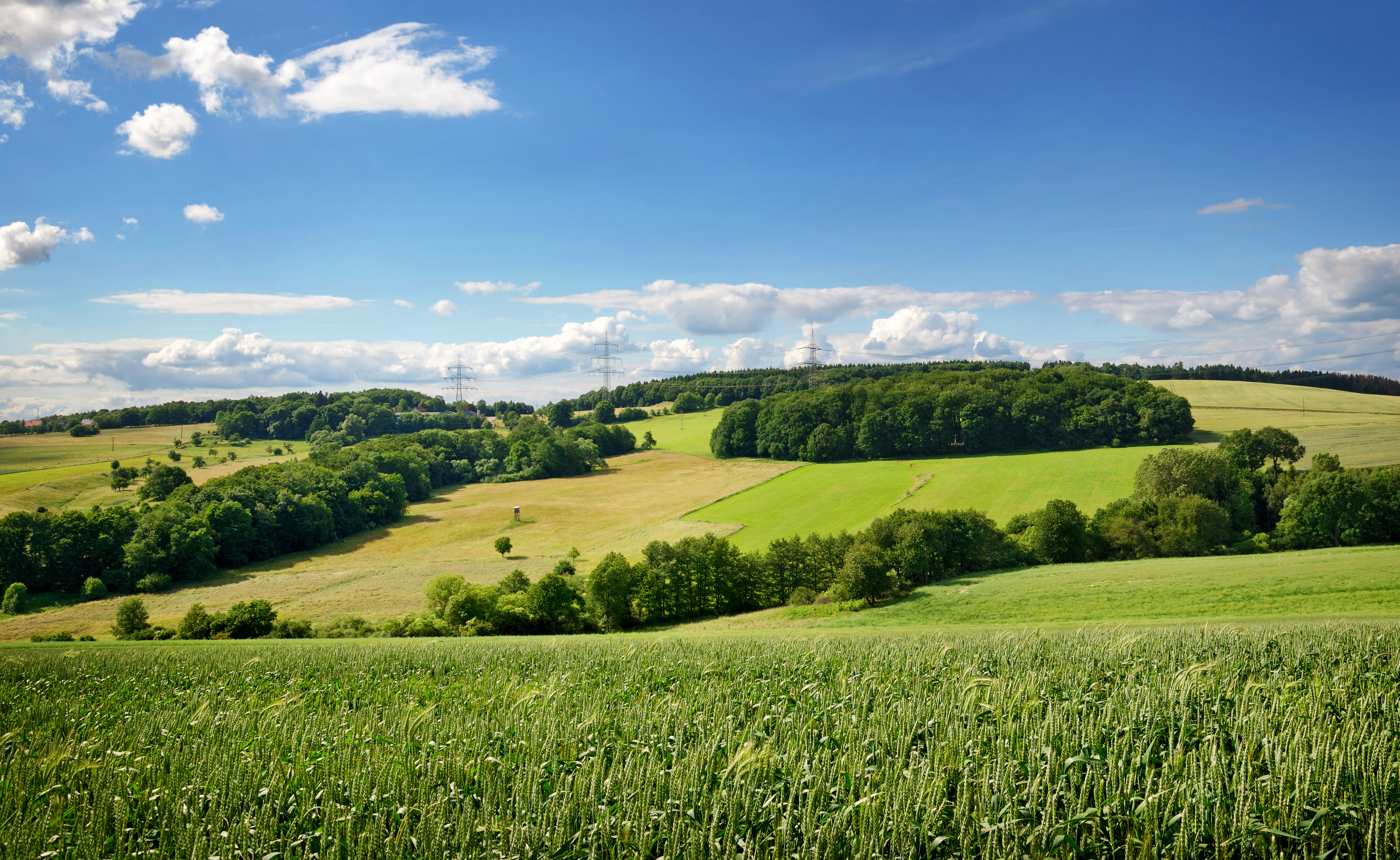- applied sciences
- Tuesday 28 May 2019, 10:00 - Wednesday 29 May 2019, 20:00 (CEST)
Practical information
- When
- Tuesday 28 May 2019, 10:00 - Wednesday 29 May 2019, 20:00 (CEST)
- Languages
- English
Description
Agricultural policy for the environment or environmental policy for agriculture?
Enhancing the environmental and climate ambition of the EU farming sector is central to the latest European Commission's proposal for the reform of the Common Agricultural Policy (CAP).
The theme of this seminar is the policy and research implications of these heightened environmental and climate ambitions.
The Commission department for Agriculture and Rural Development (DG AGRI) and the Joint Research Centre (JRC) are supporting the European Association of Agricultural Economists (EAAE) in the organisation of the 172nd EAAE seminar.
ObjectivesProgrammeCall for papersRegistrationCommitteesBackgroundImportant datesVenueContactObjectives
Objectives include:
- Discuss the economics-policy nexus of agriculture and the environment in the context of the CAP post-2020.
- Promote discussions on current and future aspects of the CAP.
- Enhance the understanding of opportunities and limits of CAP environmental and climate ambition.
- Analyse the policy design and impact of agri-environmental and climate-friendly practices.
- Provide a platform to foster direct discussions between academia and policymakers.
- Identify areas of policy action and further research needs.
Programme
The programme aims to maximise exchange between policymakers and academics.
Opening session: The agricultural-environmental economics and policy nexus of the future CAP
Chair: Alfons Oude Lansink (European Association of Agricultural Economists (EAAE), Secretary General)
Background: The opening session provides the unique opportunity to hear from four high-level representatives of the European Commission how they see the challenges of enhanced environmental and climate ambition in agricultural policy design.
Speakers:
- Jerzy Plewa, Director-General, DG for Agriculture & Rural Development (AGRI)
- Daniel Calleja Crespo, Director-General, DG for Environment (ENV)
- Artur Runge-Metzger, Director, DG Climate Action (CLIMA)
- Charlina Vitcheva, Deputy Director-General, DDG Joint Research Centre (JRC)
Academic plenary session: Challenges for enhancing environmental objectives of agricultural policy
Chair: Claudia Olazabal (European Commission, Head of Unit at Directorate-General for the Environment)
Background: This plenary session should be the mirror from an academic perspective of the policy plenary session. It starts with an overview of the performance of different agricultural systems in terms of environmental ambition and other objectives. In this respect, the work of The Economics of Ecosystems and Biodiversity (TEEB) initiative on "Measuring what matters in agriculture and food systems" sets the scene, followed by a theoretical presentation on different approaches to include the environmental performance and other objectives in the assessment of the policies (beyond output). The other two contributions present how academia has looked at policies that foster enhanced environmental performance, with one focusing on how to embed output-based design into the assignment of contracts and the other on how new challenges arise compared to traditional agricultural policy.
Speakers:
- Measuring what matters in agriculture and food systems
Salman Hussain (The Economics of Ecosystems and Biodiversity (TEEB) for Food and Agriculture, United Nations Environment Programme TEEB Coordinator)
- What's in performance? Alternatives to incorporate environment outputs into productivity measurement
Bernhard Brümmer (University of Göttingen, Professor)
- Incorporating environmental concerns in programme allocation: The case of the US
Daniel Hellerstein (United States Department of Agriculture (USDA), Researcher at Economic Research Service)
- Identifying behavioural barriers to changing farming practice
Sophie Thoyer (Institut national de Recherche en Sciences et Technologies pour l'Environnement et l'Agriculture (IRSTEA), Director)
Policy plenary session: International experiences with agri-environmental policy design and application
Chair: Florence Buchholzer (European Commission, Advisor Foresight and Impact Assessment at Directorate-General for Agriculture & Rural Development)
Background: This session brings together experts from different geographical regions to talk about their experiences and the lessons learned in designing and applying agricultural and environmental policy measures. The objective is to learn more about specific policies as well as the political and societal priorities underpinning their design and implementation. Specifically, the following questions will be addressed:
What types of agri-environmental measures are currently applied and at what geographical or administrative scale?
What is the specific context of these measures and for how long have they been applied?
How are farmers responding/accepting these measures?
How is the outcome of the programmes/measures assessed, and with what indicators?
Do the applied measures deliver the expected environmental outcome? What are the determining factors for success or failure?
Speakers:
- EU
Giovanni De Santi (Joint Research Centre (JRC), Director of Sustainable Resources)
- EU
Hans Bruyninckx (European Environment Agency (EEA), Executive Director)
- Brazil
André Guimarães (Amazon Environmental Research Institute (IPAM), Executive Director)
- United States
Marca Weinberg (United States Department of Agriculture (USDA), Economic Research Service, Director of the Resource and Rural Economics Division)
- South Asia
Mio Oka (Asian Development Bank (ADB), Director Environment, Natural Resources and Agriculture Division South Asia)
Call for papers
Participants (EU and non-EU participants) are invited to contribute scientific papers.
Abstracts
Authors need to first submit an extended abstract of maximum 2 pages (1 000 words) in English by 15 February 2019.
The abstract should indicate the:
- Question addressed,
- Concepts and theories to which one refers,
- Methodology used,
- Results obtained, and
- Policy relevance and implications.
The Scientific Committee will notify authors of accepted abstracts by 25 March 2019.
Papers
Expected topics to be covered by the papers include:
- Trade-offs and synergies between the economic, environmental and social dimensions of a policy geared towards sustainability.
- Performance-based versus output-based payments.
- Compulsory versus voluntary agri-environmental schemes.
- Data, tools and models to measure environmental and economic performance at the farm, regional, national and global levels.
- Contribution of particular CAP measures to preserve or enhance environmental benefits.
- Farmers' behaviour and participation in agri-environmental schemes.
- Environmentally and climate-friendly technologies and practices: opportunities and constraints.
- Environmental standards and indicators: rationale, measurement and evaluation.
- Identification, quantification and valuation of the demand for and supply of agri-environmental services.
- Policy measures for climate change mitigation and adaptation in agriculture.
- Impact of structural change on the environment and rural areas.
- International trade and agri-environmental performance.
- Impacts beyond the European agricultural sector.
- Institutional and legal implications.
- Lessons learned from previous CAP reforms and other international experiences.
A virtual issue of EuroChoices assembles 18 articles published from 2012 to 2019 which provide evidence and analysis relevant to the seminar's topics. This virtual issue is freely available here.
Papers presented at the seminar are uploaded in the AgEcon Search repository. The collection is freely available here.
Alison Burrell Award

Dr Alison Margaret Burrell passed away in October 2018.
Due to her intensive policy-related scientific work and close involvement with the EAAE and the JRC, the Organising and Scientific Committees have decided to grant the "Alison Burrell Award" to the best paper presented at the 172nd EAAE Seminar.
The award have been granted according to the following criteria, motivated by Alison's extraordinary writing skills and capacity as an author to communicate policy-relevant research:
- Policy relevance of the research.
- Scientific merit.
- Clarity and structure of the paper.
The winner of the award, announced during the 172nd EAAE seminar, is "Do farmers follow the herd? The influence of social norms on the participation in agri‑environmental schemes" by Philippe Le Coent, Raphaële Preget and Sophie Thoyer.
Submission
Please use our partner's conference management system to submit your contribution: Conftool
Deadlines
- Submission of abstracts: 15 February 2019
- Notifications of acceptance: 25 March 2019
- Final submission of full papers: 13 May 2019
Registration
Registration opens on 25 March 2019. Please use our partner's conference management system to register: Conftool.
Participation fees for the seminar:
- Early bird: €150 (€85 for PhD students) until 15 April 2019
- €150 EAAE membership fee for the period 2019 – 2021 (to be paid in advance of registration for the seminar - Membership can be requested on the EAAE website).
A maximum of 130 participants can be accepted on a first come, first served basis.
Committees
Organising Committee
The Organising Committee's primary responsibilities are to manage all on-site arrangements and logistics before, during and after the seminar.
organising committee
Chair: Jesús Barreiro-Hurle (JRC Seville).
Members:
- Thomas Fellmann (JRC Seville),
- Pierre Boulanger (JRC Seville),
- Maria Espinosa (JRC Seville),
- Sophie Helaine (DG AGRI),
- Hans Jensen (JRC Seville and EAAE board member),
- Koen Mondelaers (DG AGRI),
- Ignacio Pérez Domínguez (JRC Seville),
- Athanasios Petsakos (JRC Seville),
- Fabien Santini (DG AGRI).
Scientific Committee
The role of the Scientific Committee is to finalise the scientific programme schedule, review and select oral abstract presentations.
scientific committee
Chair: Tassos Haniotis (DG AGRI).
Members:
- Thomas Fellmann (JRC Seville),
- Jesús Barreiro-Hurle (JRC Seville),
- Natalija Bogdanov (University of Belgrade),
- Thia Hennessy (Cork University),
- Guido Van Huylenbroeck (Ghent University),
- Uwe Latacz-Lohmann (Kiel University),
- Maria Loureiro (University Santiago de Compostela),
- Miroslava Rajčániová (Slovak University of Agriculture),
- Sophie Thoyer (IRSTEA).
Background
The European Commission communicated that the CAP post 2020 will enhance its European added value by reflecting a higher level of environmental and climate ambition.
The policy is set to shift the emphasis from compliance and rules towards results and performance.
In this sense, the interplay of economic, environmental and social dimensions needs to be revisited as the key theoretical basis for support to agriculture.
The agricultural policy context also requires reflection on the role of direct payments as an environmental policy tool, and the delivery systems for environmental services and protection.
The question is then if and how support should be granted to farmers as providers of public goods.
Against this background, the political debate can benefit from further applied scientific insight on policy design, implementation mode and its environmental and socio-economic impacts.
Important dates
- 15 February 2019: Submission deadline for abstracts
- 25 March 2019: Notifications of acceptance & registration opens
- 15 April 2019: Early-bird registration deadline
- 13 May 2019: Deadline for submission of full papers
- 15 May 2019: Late riser registration deadline
Venue
Museum of Natural Sciences, Brussels 29 Rue Vautier 1000 Brussels Belgium How to get there.Contact
Email: JRC-172EAAE-Seminar ec [dot] europa [dot] eu (subject: 172nd%20EAAE%20Seminar%20) (JRC-172EAAE-Seminar[at]ec[dot]europa[dot]eu)
ec [dot] europa [dot] eu (subject: 172nd%20EAAE%20Seminar%20) (JRC-172EAAE-Seminar[at]ec[dot]europa[dot]eu)
Related Content
Future of the common agricultural policy
Venue
Brussels, BE

